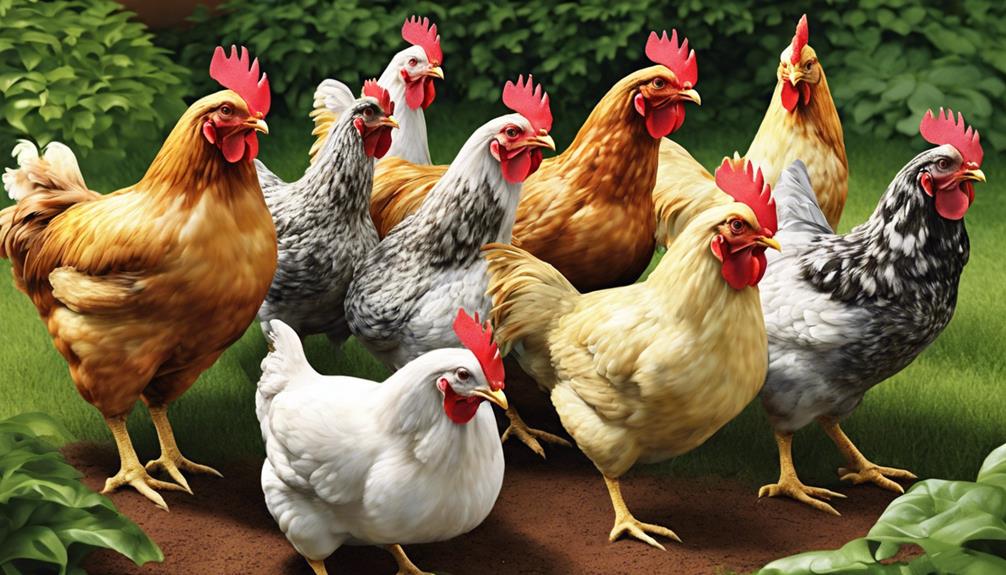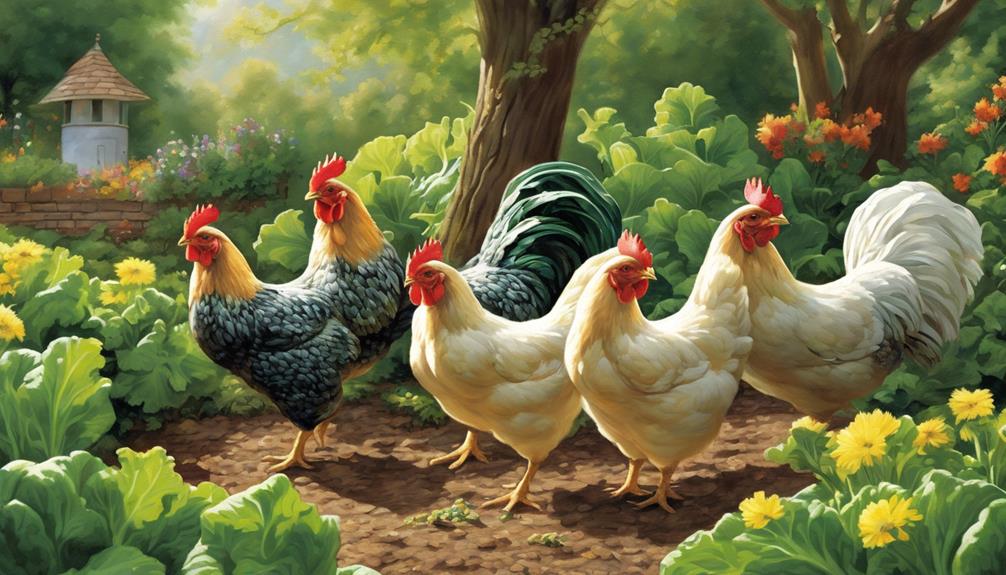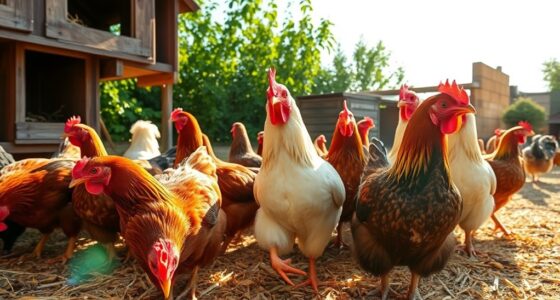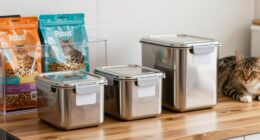We have discovered that chickens can safely consume slugs from untreated areas when given in small quantities and observed for any negative responses. This natural supplement to their diet provides a valuable source of protein and fat, which could enhance their general health and immune systems. Be sure to seek advice from a veterinarian for guidance on the proper care and well-being of your chickens.
Further information on this topic can provide more insights into the benefits and risks associated with feeding slugs to chickens.
Key Takeaways
- Source slugs from untreated areas to avoid toxins and parasites.
- Start with small amounts and gradually increase to monitor reactions.
- Consult a vet before introducing slugs to chickens' diet.
- Benefits include protein intake, immune system enhancement, and diet diversification.
- Risks include respiratory issues, rat lungworm infections, and poisoning from pellets.
Identifying Safe Slugs for Chickens
When selecting slugs for chickens to eat, it's crucial to ensure they're from untreated areas to prevent potential harm from toxins or parasites. Chickens eat slugs as part of their natural foraging behavior, but not all slugs are safe for consumption. Some species of slugs can be toxic to chickens, causing harm to their health. It's essential to be cautious when allowing chickens to eat slugs and ensure that the slugs collected are from areas free of pesticides or chemicals that could be harmful to the chickens.
Furthermore, wild slugs may carry parasites that can pose health risks to chickens. These parasites can infect the chickens and lead to various health issues if ingested. Therefore, it's recommended to consult a vet before introducing slugs into the chickens' diet to ensure that it's safe for them to consume.
Additionally, when feeding chickens snails, it's important to cook them well to eliminate any harmful organisms that they may contain. Taking these precautions can help maintain the health and well-being of the chickens when they eat slugs.
Introducing Slugs Into Chickens' Diet
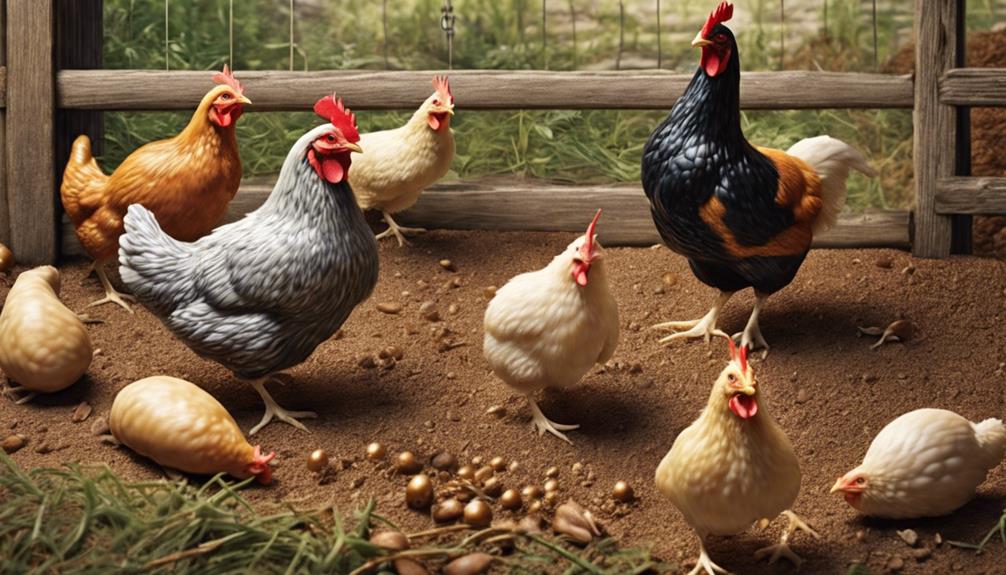
To successfully introduce slugs into chickens' diets, it's essential to monitor their response gradually and watch for any adverse reactions or digestive issues. When incorporating slugs into the chicken coop, follow these key steps:
- Gradual Introduction: Start by offering small amounts of slugs to the chickens and gradually increase the quantity over time. This helps the chickens adjust to this new food source without overwhelming their digestive system.
- Monitoring Behavior: Keep a close eye on the chickens after introducing slugs. Watch for any changes in their behavior, such as reduced egg production or unusual lethargy, which could indicate a negative reaction to the slugs.
- Health Assessment: Regularly assess the overall health of the flock when slugs are part of their diet. Check for any signs of digestive issues or discomfort, and consult a veterinarian if any concerns arise.
Benefits of Chickens Eating Slugs
After gradually introducing slugs into chickens' diets and monitoring their response, it becomes evident that the benefits of chickens eating snails are multifaceted and significant for their overall health and well-being. Chickens benefit from consuming snails as they offer a rich source of protein and fat, essential for their balanced diet.
Snails can serve as a natural treat for chickens, contributing to their nutritional intake and overall vitality. By eating snails, chickens can diversify their diet, which, in turn, enhances their immune systems and well-being. When collected from untreated areas to prevent contamination with harmful chemicals, snails can be a safe and valuable addition to chickens' nutrition.
Moderation is key when offering snails to chickens, ensuring they receive the nutritional advantages without overindulging. With a wide variety of nutrients that snails provide, incorporating them into chickens' diets can positively affect chickens' health and happiness.
Risks Associated With Chickens Eating Slugs
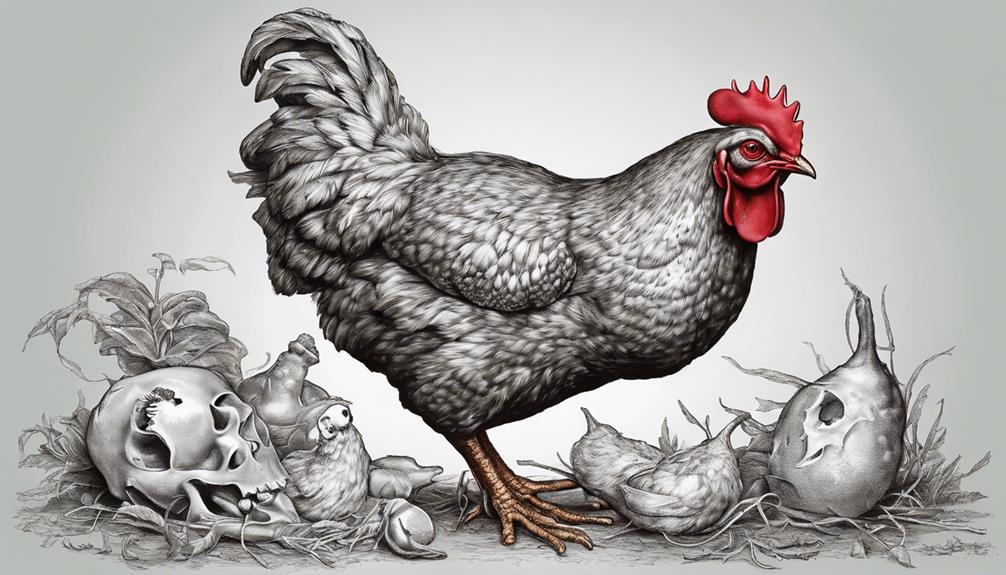
While chickens benefit from consuming slugs in their diet, it's crucial to be aware of the potential risks associated with this practice. Chickens can contract gapeworm from slugs, leading to respiratory issues and potential death. Additionally, rat lungworm, another parasite, can infect chickens through slugs that have consumed infected rat droppings. Symptoms of gapeworm and lungworm infections include lethargy, breathing difficulties, and loss of appetite in chickens.
Regular deworming of chickens is essential to reduce the risk of infections from slugs and snails.
Poison pellets used to kill snails can be harmful to chickens if ingested, posing a danger to their health.
Monitoring the health and behavior of chickens that have access to slugs can help in early detection of any potential issues and prompt treatment.
Best Practices for Feeding Chickens Slugs
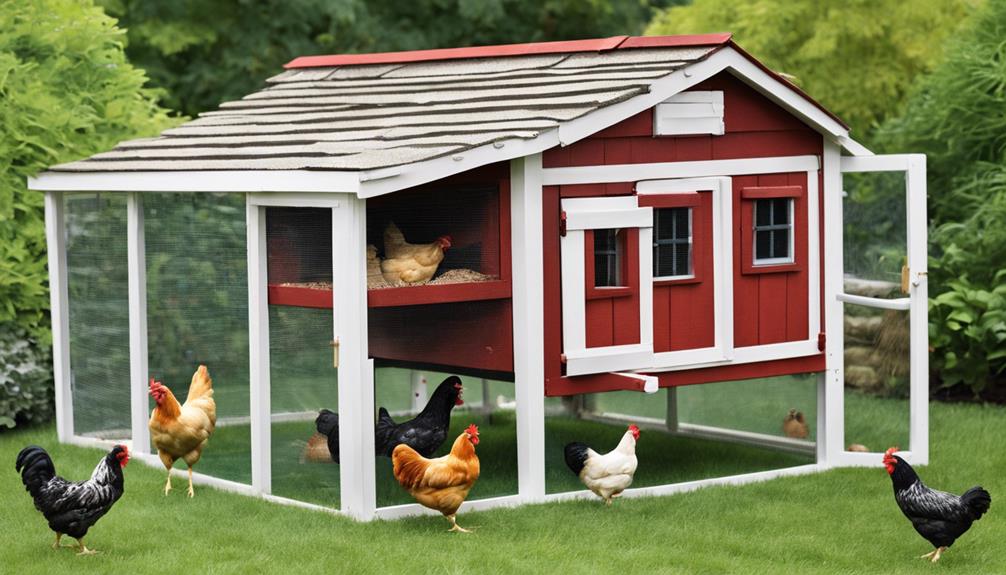
Moving from the risks associated with chickens eating slugs, a key aspect to consider is implementing best practices for feeding chickens these creatures to ensure their well-being and health. When it comes to incorporating slugs into your chickens' diet, moderation is crucial. Offering slugs as occasional treats can provide a diverse range of nutrients and contribute to boosting their immune systems. However, overfeeding slugs to chickens can lead to digestive issues, so it's important to limit their consumption.
Before introducing slugs into your chickens' diet, it is advisable to consult a veterinarian. A professional opinion can help ensure that the slugs are safe for consumption and provide nutritional benefits to your flock. Additionally, collecting slugs from untreated areas is essential to prevent contamination with harmful chemicals that could harm your chickens.
Below is a table summarizing the best practices for feeding chickens slugs:
| Best Practices for Feeding Chickens Slugs | |
|---|---|
| Feed in Moderation | Collect from Untreated Areas |
| Consult a Veterinarian | Ensure Nutritional Benefits |
Frequently Asked Questions
How Do You Eat Slugs Safely?
We eat slugs safely by ensuring we source them from untreated areas and avoid toxic species. Moderation is key, as these can be beneficial protein sources when fed appropriately. It's crucial to consult a vet before introducing them into our diet for safety.
Cooking snails thoroughly is essential, providing us with protein and calcium benefits. By following these guidelines, we can enjoy slugs as occasional treats while keeping our health in check.
Is Sluggo Safe for Chickens?
Yes, Sluggo is safe for chickens. It contains iron phosphate, a non-toxic substance that poses no harm to poultry if ingested.
Unlike metaldehyde-based baits, Sluggo is safe for chickens even if they consume treated slugs. This bait is approved for organic gardening and is considered safe for pets and wildlife.
Using Sluggo around chicken enclosures can help control slugs and snails without endangering the birds.
Can Chickens Eat Beer Soaked Slugs?
Yes, chickens can eat beer soaked slugs, but moderation is crucial. Chickens may find the scent and taste of beer soaked slugs enticing. However, it's important to offer this as an occasional treat rather than a regular part of their diet.
Monitoring the chickens after consuming beer soaked slugs can help ensure their health and well-being. The alcohol content in the slugs is minimal after being eaten by the chickens.
Can Chickens Get Worms From Slugs?
Yes, chickens can get worms from slugs. Gapeworm, a red parasite that infects a chicken's respiratory system, can be transmitted through slug consumption. Symptoms include lethargy, difficulty breathing, and loss of appetite. Deworming with medications like Flubenol and Aviverm can treat gapeworm infections.
While less common, chickens can also contract gapeworm from eating snails. Avoid feeding chickens poison pellets used to kill snails, as they can harm the birds if ingested.
Is it Safe for Chickens to Eat a Variety of Foods, Including Slugs and Raw Asparagus?
Yes, chickens eating raw asparagus expert agree that a variety of foods, including slugs and raw asparagus, can be safely incorporated into their diet. Asparagus provides essential nutrients, while slugs are a natural source of protein. However, moderation and variety are key to a balanced and healthy diet for chickens.
Conclusion
In conclusion, feeding chickens slugs can be a beneficial addition to their diet, as long as precautions are taken to ensure the safety of the slugs. Remember, not all slugs are created equal, so it's important to identify safe options for your flock.
By following best practices and monitoring their intake, you can turn your chickens into slug-eating machines, helping to keep your garden pest-free. It's like having tiny, feathered pest control experts roaming your yard.
